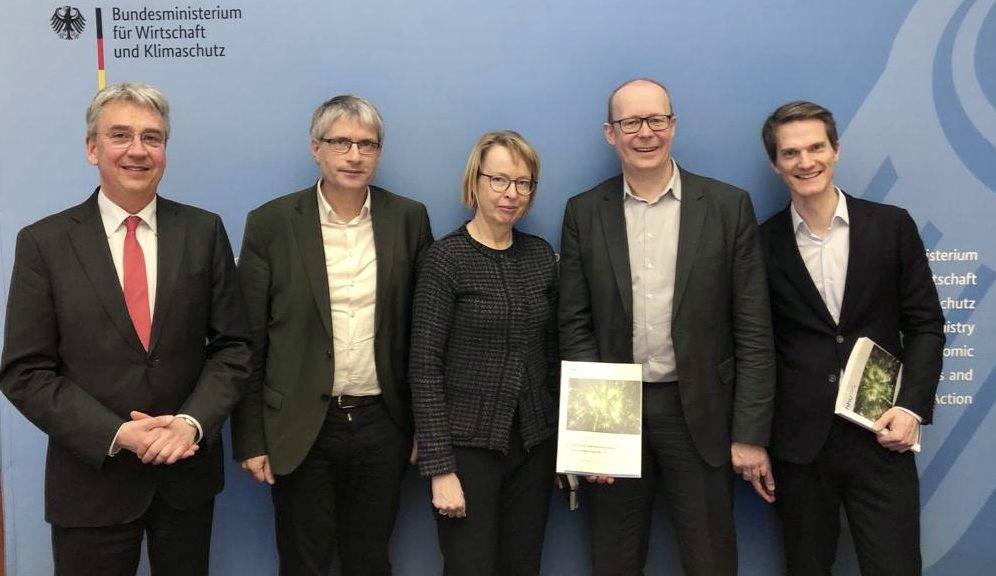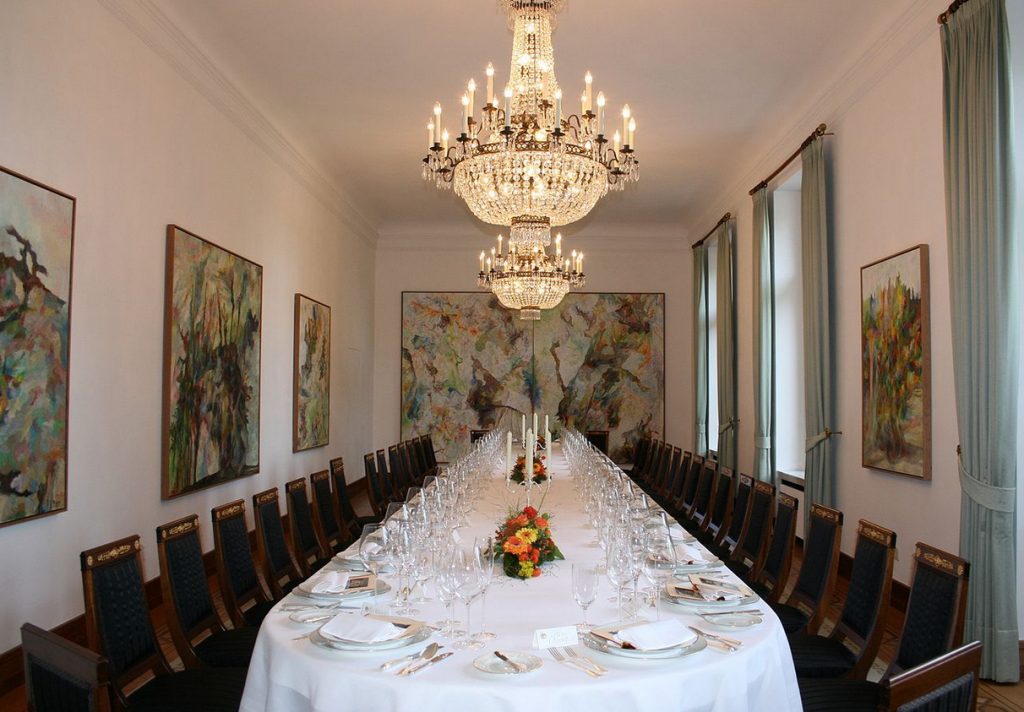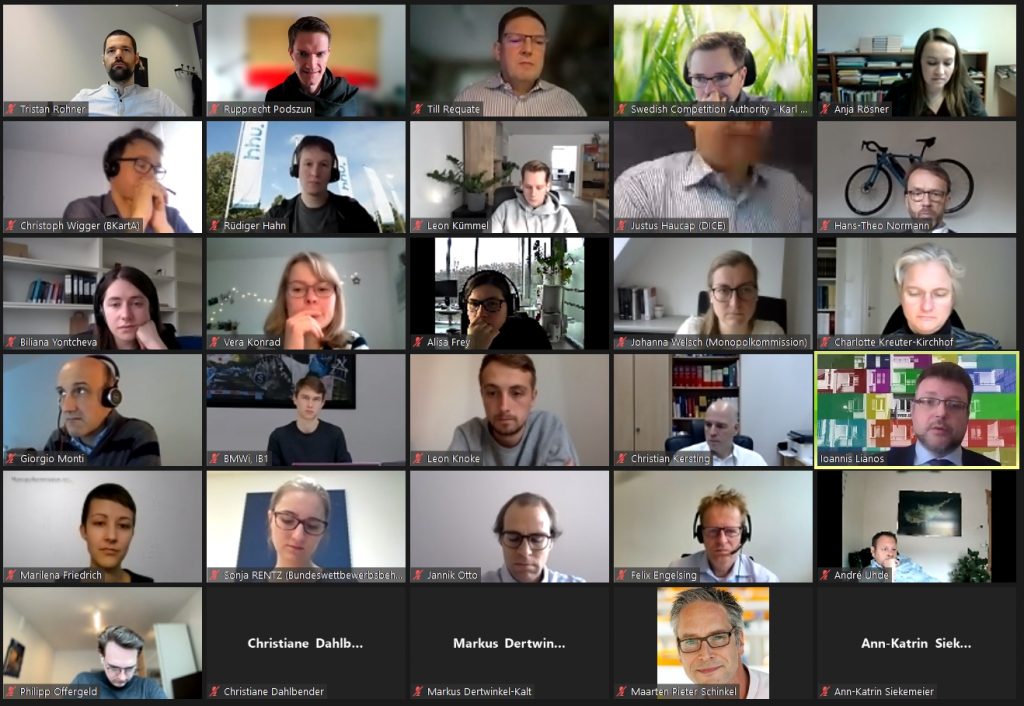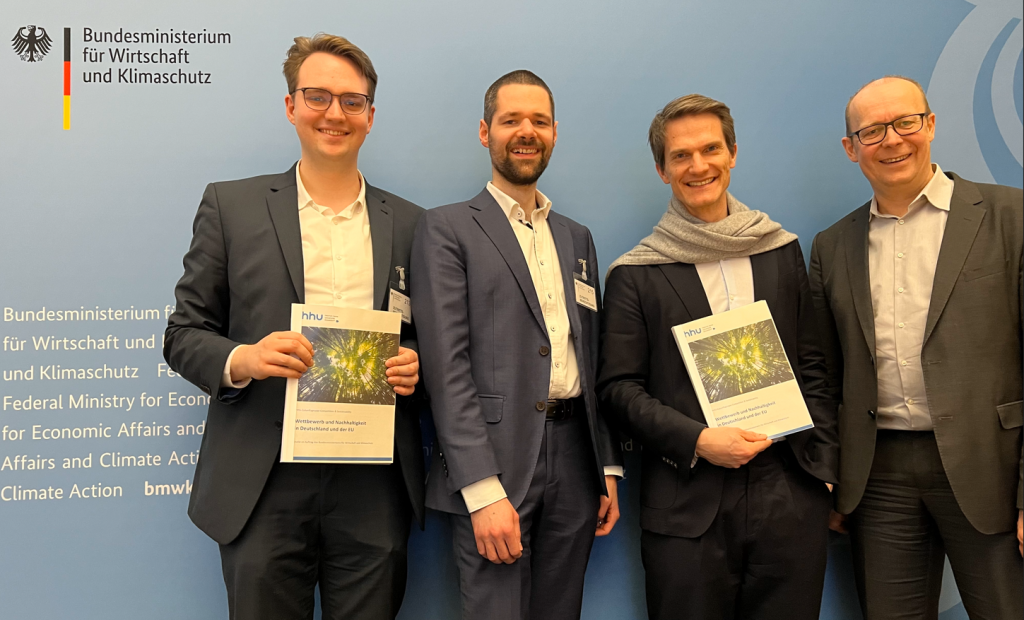
The Blue Wall: Competition and Sustainability in Berlin
PDF Version: Click here
Suggested Citation: Podszun, DKartJ 2023, 18-21.
Are companies allowed to collude with other companies to jointly reduce CO2 emissions? Hardly any other question has been discussed more often at antitrust conferences across the country in recent years. This is also due to the fact that the first green-led Federal Ministry of Economics and Climate Protection in Germany has named sustainability as a key topic in its Competition Law Agenda 2025. Researchers at the Heinrich Heine University in Düsseldorf have now presented a comprehensive report for the Ministry: “Competition and Sustainability in Germany and the EU”. It can be accessed via this link. Justus Haucap and Rupprecht Podszun were in charge and presented the report in Berlin this week. Podszun reports here on how the excursion to the Berlin stage went.
In the office of the State Secretary
There are still fifteen minutes to go before the presentation of the expert opinion is to start, when the State Secretary asks us into his office. There had been a slight delay in entering, apparently he had something to discuss in private with the President of the Cartel Office, Andreas Mundt, who is already with him. The latest in the German government’s coalition poker over the 11th amendment to the competition act? The number of new posts Mundt urgently needs to support the European Commission in DMA enforcement? Or was it just quite banal about the relocation of the Federal Cartel Office, which at least caused a storm in a teacup in the Bonn daily Generalanzeiger?
When we are allowed in, the room is quickly full and State Secretary Sven Giegold, the second-highest ranking official in the Ministry, greets us dryly: “I don’t have that many chairs.” Apart of him and Mundt, Thorsten Käseberg, Head of Unit for Competition Policy in the house, and his team have gathered, as well as our team: Justus Haucap, Tristan Rohner and Philipp Offergeld from my team and me. So how do you pass the time while standing somewhat awkwardly in the seating area? We talk about the office furnishings. On the walls are pictures by Bernard Schultze, which Giegold took over from his predecessor. Schultze, an artist who participated in the documenta several times, paints abstractly and is one of the founders of Informel. Fits Giegold somehow. “I only had the ships cleared away,” he says. Previous occupant Ulrich Nußbaum, State Secretary under Minister Peter Altmaier, has a soft spot for seafaring. The ship models have now been taken down and anchored in the archives. Giegold apparently had no time for an independent redesign of the office. Where the minister already has to eat his muesli in the morning with water, not milk, as he once told in a Spiegel film, the state secretary cannot be expected to take care of the interior design first.

The transformation
By German standards, it is an astonishing change even without new decorations: for the first time, a Green, Robert Habeck, moved into the Federal Ministry of Economics (which is now the Ministry of Economics and Climate Protection). A long row of black-and-white portraits, which we rush past a short time later in order to get to our own presentation of the report in time, reminds us of legendary predecessors: Ludwig Erhard! Karl Schiller! Otto Graf Lambsdorff!
Regulatory policy is possibly on the verge of being redefined, and that is what this sunny afternoon in Berlin should be about. In any case, I myself am convinced that the conceptual framework of economic law will be profoundly changed. (Foreign readers may forgive me for talking about regulatory policy, frameworks, etc. in an old-school ordoliberal way instead of simply noting down a few mathematical formulas).
First, the digital revolution changed the economy, to which competition policy responded with new instruments, from Section 19a GWB to the Digital Markets Act. Now the planet is racing towards its boundaries, forcing an even harder transformation. The actors of this green transformation (not meant here in a party-political sense) are in an unusual mixed situation: everyone has to pull together. Waiting for policy guidelines is not enough. Corporate actors need to act. This puts the market-regulating authorities, like the competition agencies, under pressure – they will have to loosen and tighten anti-trust laws.
Good companies?
And this brings us to the middle of the sustainability debate in competition policy. The first rethinking must already lie in the fact that companies are agents of transformation, even if at first glance it seems incompatible with their inherent profit motive. Charlotte Kreuter-Kirchhof, professor of energy and international law, among other things, and co-author of our study, has told us again and again: the United Nations Sustainable Development Goals (SDG) oblige companies to act. And more and more companies are taking action – whether out of altruism, to better appeal to consumers and on the job market, or to gain easier access to capital (sustainable finance) remains to be seen. Sven Giegold, who has a penchant for fundamental considerations, speaks of “corporate citizenship” and of traditions in the Christian social ethics.
This makes it a difficult tightrope walk for competition watchdogs, that, saturated with life experience, do not always immediately assume the good in companies: What is convincing sustainability management, what is greenwashing? For us as authors of the expert opinion, the criteria have hardly become clearer. There is a lack of examples of agreements where companies want to be green but fail because of competition law limits, at least in reality.
Sometimes the demands for a far-reaching exemption of such cooperations remind me of the whining of the representatives of the press associations who demanded relief at all costs a few years ago. When politicians created the coveted Section 30 (2b) GWB in 2017, practical examples remained scarce. With this in mind, I believe there is no room for the creation of a general exemption, a statutory exemption on the Austrian model or a block exemption regulation. More guidance, the definition of groups of cases, yes. The Bundeskartellamt promised to help here. My economist colleague Justus Haucap, it seems to me, has fallen in love with the idea of sustainability sandboxes: a temporary experimental space to try things out under supervision. The Hellenic competition agency has this on the agenda. If this works, there will be some material to balance the restrictions on competition and sustainability effects in a better way.
Narrow-minded guidelines
For those agreements with a lot of impact, it is the European Commission that matters – not the German government. The draft Horizontal Guidelines miss the mark. There is a lack of clear recognition of out-of-market efficiencies, i.e. advantages that do not directly benefit consumers negatively affected by an agreement. This is astonishing in view of the internationally agreed understanding of sustainability: the UN SDGs want to prevent economic activity at the expense of others, both in a temporal dimension (inter-generational) and in a geographical dimension (intra-generational). Against this background, it seems narrow-minded if the improvement of air quality in Asia may not be weighed against higher consumer prices in Europe.

Some headlines, please
Giegold, who is likely to have a rather wide, not narrow mind, remains reserved in the discussion. The State Secretary has left the role of moderator to the head of department, Elga Bartsch, who succeeded Philipp Steinberg, who is now responsible for “Economic Stabilisation and Energy Security” at the Ministry. Giegold means it that he wants to listen before pre-determining outcomes of the debate. Our study is available now. Interested parties have been given until 6 April 2023 to read the 284 pages. Until then, feedback is expected at nachhaltigkeit-ib1@bmwk.bund.de.
With the Deputy Minister not speaking out that’s not a lot for the media. What is the message of this presentation supposed to be? Can’t Giegold just knock one out of the park? I’m thinking of Stephan Orti von Havranek, I met him unexpectedly at Gate 1 of the Ministry. I got to know him many years ago when he was still head of the unit at the Federal Cartel Office that compiled the relevant headlines of the day early in the morning. What would the Office’s press documentation team be able to file from our presentation? Orti von Havranek is no longer in charge, he is now the chairman of the main staff council of the Ministry.
So it is up to President Andreas Mundt, eloquent as ever, to offer a headline that is at least of some interest to the special interest magazine Lebensmittelzeitung: “Art. 210a of the CMO creates a broad exception. We will be surprised what comes out of this”, Mundt is quoted as saying. Initiative Tierwohl, the Bundeskartellamt’s key case on sustainability in competition, will be examined in Brussels in future.
Concrete options
Justus Haucap and me – we are never too shy for a quotable saying – cannot contribute much sensational this time. That’s because of our mandate – and because of the blue wall.
The mandate the Ministry gave us for the expert opinion was to illuminate the area of tension between competition and sustainability and to present concrete options for the further development of competition law. We were not asked to give recommendations. That is what we did – together with Charlotte Kreuter-Kirchhof, Sustainability Management Professor Rüdiger Hahn and the researchers Tristan Rohner, Anja Roesner, Philipp Offergeld and Alexandra May.
I would have loved to say something like: Andreas Mundt, your agency must now conduct an abuse case against a dominant company that free-rides on external effects! Facebook reloaded, but this time with climate protection instead of data protection! But of course that would have been far too bold (especially since the question of what Facebook actually has to do with data protection is certainly open to debate).
Now, in every study, the very first footnote is a setting that comes with normative assumptions. For example, we still consider the market economy as a system to be indispensable. We don’t need to explain this in detail to the readers of this blog, but outside of the relatively small fan community of free competition, the question has long been asked whether an economy based on growth and consumption is still sustainable at all. Marita Wiggerthale, once active in the Alliance to Restrain Corporate Power, alluded to this in a question at the presentation of the report. Haucap and Podszun think: Without the incentive of competition, the necessary innovations and adjustments will hardly be possible.
Sustainable Competition
Nevertheless, where companies have cost advantages due to predation, something needs to be fundamentally corrected. On the one hand, this is simple market failure theory. On the other hand, it should send a shiver down the spine of many managers. I think this is one of the strengths of the report: we do not stop at the issue of sustainability cooperations, but also systematically examine merger control, abuse of dominance law (see here), procedures and sanctions for their sustainability effects.
Wherever damage to sustainability is related to competition, competition law can become relevant. Anyone who frowns here should read the passages on socio-ecological competition in our study – and, to be on the safe side, also the current IPCC report. Why should we allow or protect competition that will lead to the collapse of the market economy in some time? Sustainable Competition could replace the consumer welfare standard as a benchmark. One thing is certain: the calculation will not get any easier. But such a setting would not be more ideological than the Chicago School, it would just come from a different direction.
But I didn’t deliver such provocations with verve in front of the blue wall. The blue wall, that is the stand with the large PVC banner in this federal government blue colour, with the eagle, ministry logo and considerable seriousness. We took our seats in front of it, looking into the camera eye that projected us into millions of households (or maybe 114 at the peak). The aura of this official arrangement did activate in a novice like me an extraordinary respect for the task. I was comforted by the fact that even Justus Haucap – unlike in our podcast on the subject – refrained from using corny jokes. After all, we were now part of the federal government’s blue establishment for a brief moment.
Now it’s time to read!
After the presentation of the report, everything happened very quickly. The audience in front of the screens downloaded the report and started reading. Sven Giegold and Elga Bartsch shook our hands and mumbled something about “we need to see the Minister”. The next morning we would read in the papers that their boss made some noise in the coalition. His staff, Thorsten Käseberg, Markus Jankowski (on loan from the Bundeskartellamt), Anna-Lena Beate, Sophie Gappa and Johannes Keim, were loosened up, a minute to catch their breath, the sustainability study was off the table for now (they still have enough to do these days).

We took a souvenir photo in front of the blue wall. I wondered whether the colour printout of the report was really necessary – sustainability, you know. A ministerial official, who cannot be named here, got lost with us looking for the exit, but normally she does her day’s work in Alt-Moabit and not in Scharnhorstraße.
Yes, read our report. (It’s in German with an English executive summary). When I last opened the report by chance, I stumbled over the sentence that in the ministerial permit procedure “- in the case of Miba/Zollern – sustainability aspects had already been addressed”. I quickly turned the page to avoid finding the option of a sustainability ministerial permit (cf. p. 174). So, I stopped elsewhere, and this happened to be page 204:
“On the other hand, there are also problems in competition law that need to be solved – irrespective of the sustainability debate: the still insufficient international integration beyond the EU, the sometimes overly complex and lengthy procedures, the requirements of proof that occasionally seem excessive or the integration of private enforcement that could be expanded are examples of this. If competition law is to take on more far-reaching tasks, it must be “fit for purpose” – this should not be overlooked despite all the enthusiasm for competition law instruments.”
What a beautiful sentence!
Rupprecht Podszun is a law professor at Heinrich Heine University in Düsseldorf and Director of the Institute for Competition Law.
The expert opinion (with an English summary) and notes on consultation can be found here:
On the debate on sustainability in competition law, there are also several contributions in the book “Kartellrecht in der Zeitenwende – Auf dem Weg zur 11. und 12. GWB-Novelle” by Alexander Kirk, Philipp Offergeld and Tristan Rohner (see here).
Transparency Notice: We corrected affiliations after publication.
One thought on “The Blue Wall: Competition and Sustainability in Berlin”
Die Diskussion um das “richtige” Wettbewerbsrecht beschäftigt das BKartA, die Politik, Kartellrechtler und Ökonomen seit jeher. Und seit den frühen 2000er-Jahren haben sich ja schon viele Bereiche geändert. Wettbewerbsrecht ist und bleibt spannend.